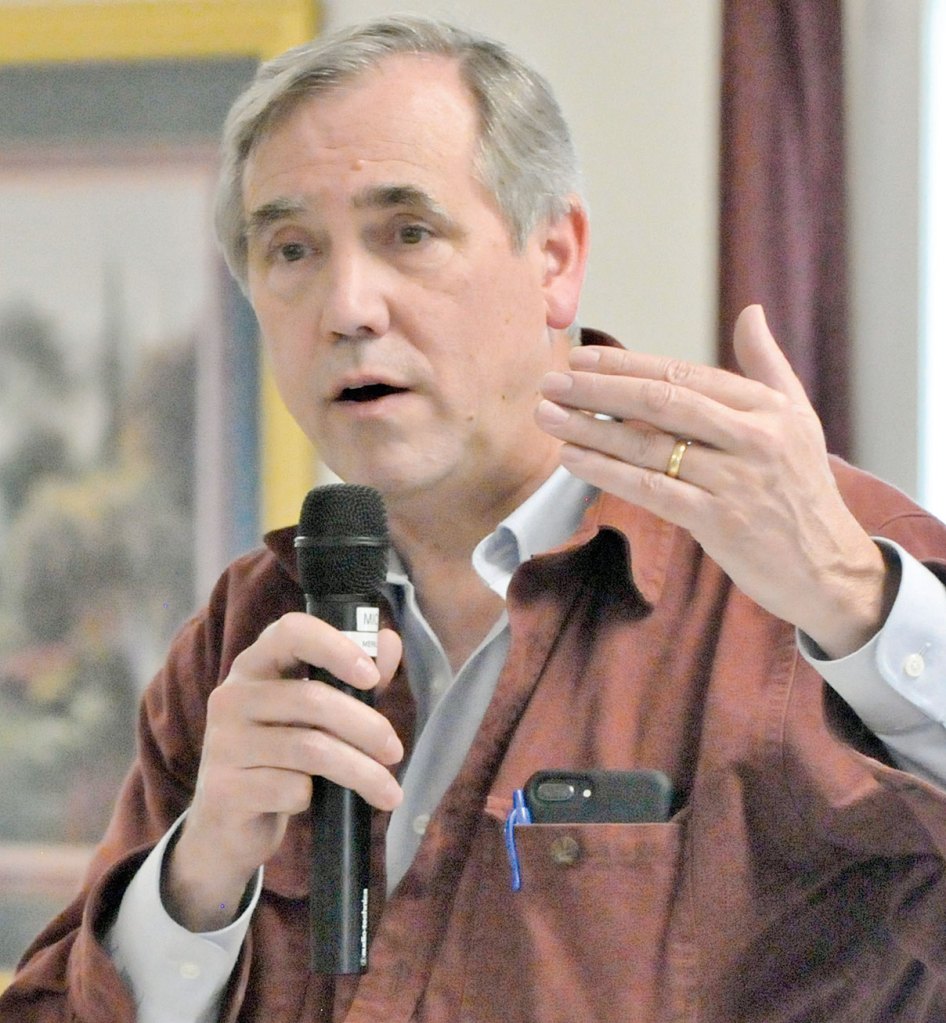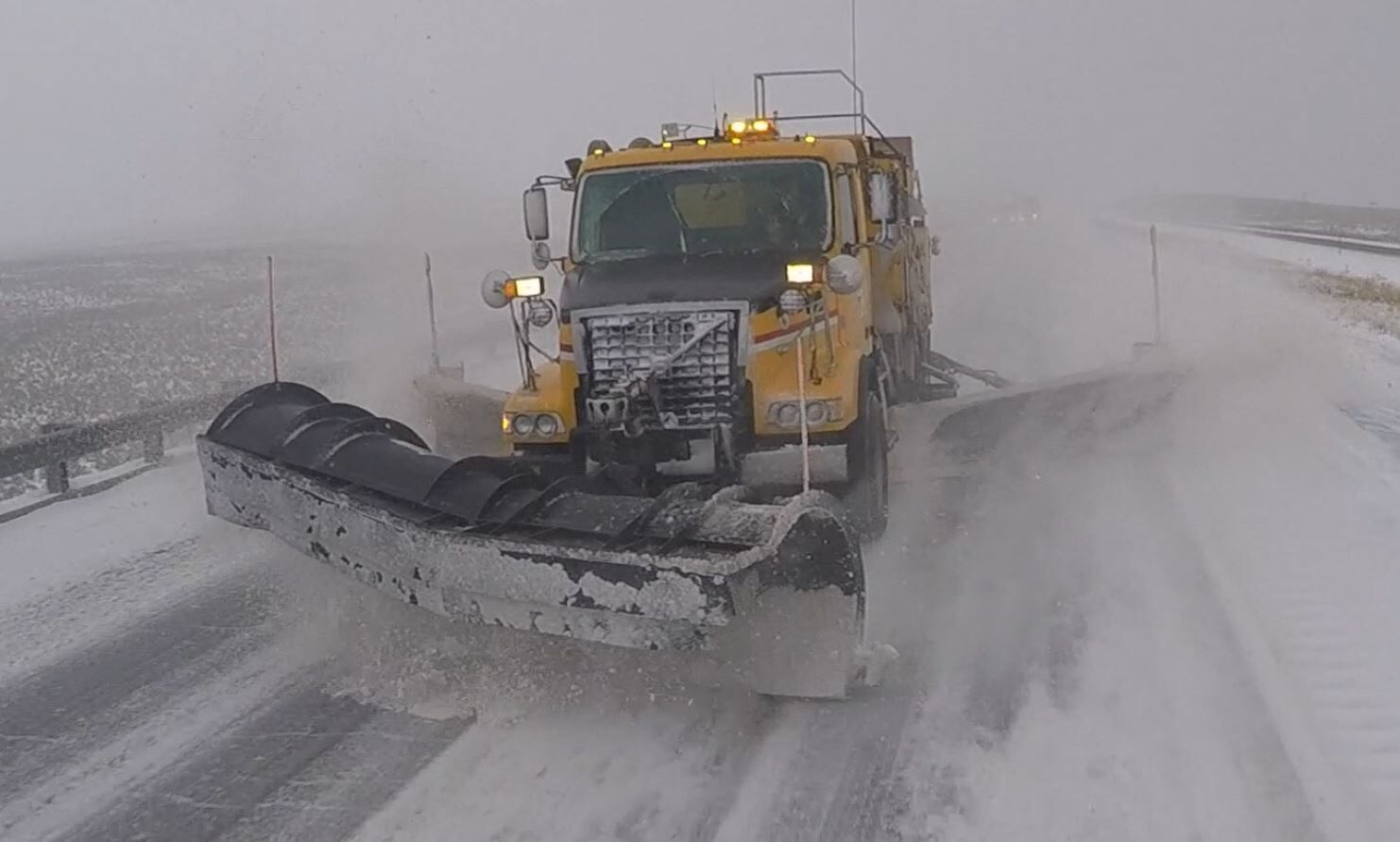Merkley In Town
Published 7:30 am Saturday, April 27, 2019

- S. John Collins / Baker City HeraldSen. Jeff Merkley speaks during a town hall meeting Wednesday afternoon at the Baker City Senior Center. Merkley discussed climate change, immigration and other topics.
The national debate over last week’s release of the Mueller report on the Trump-Russia investigation extended to Baker City on Wednesday afternoon at the conclusion of Sen. Jeff Merkley’s town hall at the Senior Center.
Trending
Whitey Bloom of Halfway asked the final question of the hour-long event, which attracted about 50 people.
Bloom, who contends that the redacted version of special counsel Robert Mueller’s report exonerated President Trump, asked Merkley, a Democrat and a frequent Trump critic, whether the junior senator was “ready to accept those results and move on.”
Merkley, who fielded questions from about 3 p.m. to 4 p.m., disputed Bloom’s contention.
Trending
“The report doesn’t absolve President Trump,” Merkley said.
Bloom countered: “That’s up for debate.”
Merkley responded by noting that the report lists 10 separate incidents that could constitute attempts by Trump to obstruct the investigation.
Merkley described these as “various forms of intimidation, obstruction.”
These included Trump’s firing of FBI Director James Comey and his efforts to remove Mueller as special counsel.
“They certainly look inappropriate to me,” Merkley said.
Bloom asked Merkley again whether he would “let it go?”
Merkley answered that he won’t have any direct involvement immediately because it’s up to the House of Representatives to decide whether to proceed with impeachment hearings.
Only if the House impeached Trump — analogous to a grand jury indictment in a criminal case — would the Senate become involved, in the form of a trial in which senators would decide whether to remove the president from office.
“As a potential member of the jury, I don’t think it’s appropriate for me to render judgment (now),” Merkley said. “I’m going to leave it up to the House to wrestle with.”
Merkley, who was elected to the Senate in 2008 and re-elected in 2014, didn’t win a majority of votes in Baker County in either race. Baker County’s electorate generally leans heavily toward Republican candidates in statewide and national races.
In 2014 Merkley polled at 33.2 percent in Baker County (his Republican challenger, Monica Wehby, received 60.2 percent), and in 2008 Merkley won 26 percent of votes cast in the county, while incumbent Republican Gordon Smith garnered 66 percent.
On Wednesday Baker City Mayor Loran Joseph introduced Merkley.
The senator then recognized Best Friends of Baker, a nonprofit that has helped find homes for about 6,200 dogs, cats and other animals since its founding in 1986.
Merkley said Best Friends “makes the world a better place.” He presented members of the organization an American flag that has flown over the U.S. Capitol, and encouraged audience members to consider taking home Gracie, a dog that’s available for adoption.
By way of introduction, Merkley talked briefly about what he called “three sizable challenges” facing the country.
The first involves elections, specifically “voter suppression, gerrymandering and dark money in our campaigns,” Merkley said.
Dark money refers to campaign contributions whose sources aren’t known.
He said all these factors can concentrate political power in a way that “drowns out the voice of the people.”
Merkley’s second concern is the nation’s “underinvestment” in areas that serve as the foundation for healthy, productive families — good-paying jobs, healthcare, education and housing.
“If we don’t take care of these, we have more stressed families,” Merkley said.
The third challenge the senator mentioned is rising concentrations of carbon dioxide in the atmosphere and the attendant effects on climate.
“This really hits rural America hard because it has a big impact on our farming and our forests,” Merkley said.
The changing climate is contributing to more and larger wildfires and skimpier snowpacks that leave farmers short on irrigation water, he said.
Merkley concluded his introductory comments by saying he supported the federal government’s 11-fold increase in money for installing broadband internet service in rural communities.
The senator expanded on some of his opening topics while answering questions from the audience.
The first came from Lynette Perry, a Baker City Council member. Perry said she’s concerned about the potential for fraud with Oregon’s vote-by-mail system.
Merkley said he also was initially worried about vote-by-mail. But he said his trepidation was eased in part by talking with voters, particularly while campaigning door-to-door in Roseburg while running for a seat in the Oregon Legislature in the 1990s, and more so because the system, with its secrecy envelope and required signature from the voter, has proved to be resistant to fraud.
“We do not have evidence that cheating is a problem,” Merkley said.
Immigration
Shirley McLin of Baker City thanked Merkley for publicizing conditions at centers near the Mexican border where the American government has detained people who have tried to enter the country.
McLin asked Merkley whether there is an “easy way to have a humane border policy.”
Merkley has been one of the more persistent and vocal critics of the Trump administration’s immigration policies.
The senator has visited several encampments where children are held, and he has called the administration’s system a “child prison strategy that inflicts trauma on children.”
In response to McLin’s question, Merkley said he’s especially upset by the administration’s policy that separates families, including segregating boys and girls from the same family.
The senator said the federal government needs to speed the process of scheduling hearings for immigrants seeking legal asylum in the U.S. There are about 800,000 pending hearings, he said.
Merkley said Congress made progress on a comprehensive immigration reform bill in 2013, but the House didn’t take up the proposal.
Six years later, he said the House, in which Democrats again have a majority, might be amenable to that discussion but he’s skeptical that the Senate, under GOP control, would be.
“I’m hoping we can generate bipartisan work to return to that effort,” Merkley said. “We’ve got a broken immigration system.”
Tax policy
Peter Hall, chairman of the Baker County Democrats, told Merkley he believes the government should try to boost incomes not by raising minimum wages to the point that jobs are lost, but rather by “taxing wealth” to increase the existing earned income tax credit.
Merkley said he agrees, in principle, with that idea.
Climate change
Ramon Lara of Baker City asked Merkley about one of the “sizable challenges” the senator listed in his opening comments — climate change.
“How hard are you willing to push for addressing the actions we need to take?” Lara asked.
Merkley’s response: “I think we have to move as quickly as we can.”
The senator said that although he supports the transition from fossil fuels to renewable sources, such as wind and solar, as rapidly as possible, he doesn’t believe this is a “fight between the environment and the economy.”
Merkley contends that the transition to an economy based on renewable energy “can create millions of good-paying jobs,” and that many of those will be in rural areas because that’s where most wind and solar farms are built.
But Merkley also pointed out that carbon dioxide concentrations continue to increase.
“This is an absolute disaster for our planet, and rural America is going to feel it intensely,” he said.
Any true solution to the problem, however, must be a global one, Merkley said — America acting alone can’t succeed.
He deemed “unacceptable” such things as China’s financing of coal-fired power plants in other countries, and Canadian prime minister Justin Trudeau’s support of a planned expansion of the Trans Mountain pipeline that would triple the country’s capacity to transport oil.
In response to Mary Boyer’s question about plastic pollution in the oceans, Merkley said he is aware of an experimental project to snare some of the floating plastic, but that there is no large-scale effort.
Forest management
Rob Crawford of Halfway told Merkley about recent clearcut logging on private land near Crawford’s home.
Crawford said he’s concerned that fears over wildfire will be used to justify irresponsible levels of logging on public land as well. He told Merkley he would prefer that public agencies focus on reducing the fire danger in areas near the border between public land and private homes.
Merkley said he supports projects, including ones that involve logging, which are intended to reduce the fire danger but that also improve the health of the forest, making the remaining trees more resilient to insects and disease as well as fire.
He said the best description he’s heard of this type of forest management is that it amounts to “weeding the woods” — removing smaller trees rather than the logging practices of the past in which loggers preferred the biggest trees.
He said such projects can also benefit rural economies and keep sawmills operating.
Merkley cited as an example a 10-year stewardship contract on the Malheur National Forest in Grant County signed in 2012 that guarantees a supply of sawlogs to a mill in John Day.
The Malheur Lumber mill also uses trees that aren’t suitable for boards to produce pellets used to heat homes. Those pellets also heat local schools and the Blue Mountain Hospital in John Day, said John Newell, who works at the Malheur Pellet Mill.
Merkley also talked about the newest forest product that mill will produce — torrefied briquettes, which are intended to replace coal as a fuel.
Newell said work is underway on the plant that will make those briquettes.
Merkley drew applause when he said he is bothered when he sees stacks of logs, along the Columbia River near Hood River and in other places, that were harvested in the U.S. but will be exported to Japan, China and other foreign markets.
“I want to see those logs going through our mills,” Merkley said.
Veteran issue
Steve Culley, a Vietnam veteran from Baker City, told Merkley that he’s concerned the Veterans Administration is divulging the names of veterans with Post Traumatic Stress Disorder to the federal Bureau of Alcohol, Tobacco, Firearms and Explosives, and that veterans could have their Second Amendment rights infringed on.
Merkley told Culley he would look into the issue.









